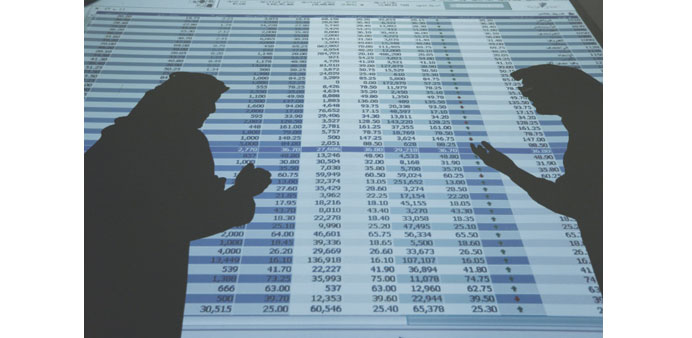The shadow of an investor is seen cast on a screen as he monitors stock prices at the Falcom investment bank in Riyadh. The Saudi benchmark yesterday rose 0.5% to 10,716 points, its highest finish since January 2008. Nearly 270mn shares changed hands, a two-week high.
Reuters
Banks led Saudi Arabia’s stock index to a new six-year peak as trading volumes increased yesterday, while Egypt also extended gains. But other Gulf markets were subdued as a summer lull deepened.
The Saudi measure rose 0.5% to 10,716 points, its highest finish since January 2008. Nearly 270mn shares changed hands, a two-week high: Saudi Arabia has not suffered the summer trading slump of neighbouring bourses.
Eight of the 10 largest stocks advanced. Riyad Bank, which last month reported a 17% increase in second-quarter profit, rose 4.5%. Lenders SABB and Al Rajhi Bank climbed 3.2% and 0.3% respectively.
“One of the most important drivers for a re-rating of the sector is the coming increase in US interest rates,” said Fahd Iqbal, head of Middle East research at Credit Suisse. “That will boost Saudi banks’ net interest margins.”
Saudi Arabia’s currency is pegged to the dollar, which means its monetary policy is expected to broadly follow US policy. US rates may start rising next year as the American economy recovers from the global financial crisis.
“A substantial proportion of Saudi banks’ deposits are interest-free Islamic deposits, so net interest margins are strongly geared to a rising interest rate environment,” said Iqbal.
The Saudi banking index rose 1.0%, taking its 2014 gains to 27.5%, while the main market index is up 25.5%. The main index has gained 9.9% since plans were announced late last month for the market to allow direct foreign share ownership next year.
“Saudi’s market has already enjoyed a good run-up, and since the announcement was made we haven’t changed our forecasts for the market,” said Iqbal. “Our initial expectation was for the market to be constrained by the psychologically important 10,000 level, but since the announcement was made to open the market I expect the top to be around 11,000.”
Meanwhile, Egypt’s index rose 0.5% to 9,437 points. That put it within a few points of Sunday’s six-year closing high, but also 60 points below the session peak as some traders booked profits.
“Egypt’s market offers good upside and good valuations for institutional investors,” said Ali Adou, portfolio manager at The National Investor in Abu Dhabi. “Political stability is supporting the recovery story. There will be corrections on the way, but those should be seen as a good opportunity to accumulate shares.”
In early July, Egypt slashed subsidies for car fuel and natural gas, increasing their prices by more than 70%, a move that prompted scattered protests but which was welcomed by investors - the index has gained 15.6% since the start of last month.
“Investors saw it as a positive step because it will help reduce the budget deficit,” said Adou. “In addition, it is a very serious step from the government towards reforms.”
Some stocks are still being propelled by the government’s announcement earlier this month that it would build a new Suez Canal alongside the existing waterway.
Ascom Geology and Mining Co jumped 9.6% yesterday after its parent Qalaa Holdings, formerly known as Citadel Capital, said Ascom had been chosen to work on the project. Qalaa’s shares rose 0.5%.
Dubai’s and Abu Dhabi’s benchmarks rose just 0.1% and 0.03% respectively.
Only three stocks - Union Properties and Arabtec in Dubai, and Aldar Properties in Abu Dhabi - saw more than 10mn shares change hands. The Dubai pair ended flat, while Aldar fell 1.0%.
In Oman, the index rose 0.3% despite losers outnumbering gainers nine to seven.
Renaissance Services was the main support, surging 7.2% to an 11-week high after the company said its unit Topaz Energy and Marine had secured a $75mn investment from Standard Chartered Private Equity.
Renaissance was the most active stock, accounting for nearly a third of all shares traded. Most other activity was in small-cap stocks. These are usually the preserve of retail investors, so their dominance suggests institutions are mostly absent.
Kuwait’s Al Madina for Finance and Investment Co rose 2.3%. The company said it had agreed on settling a $10mn debt to Global Investment House, with the impact to be reflected in its fourth-quarter financial statement. Al Madina had said in April that it hoped to sign an agreement with creditors that could have a positive impact on its financial statements in 2014.
Elsewhere in the Gulf, Kuwait’s index climbed 0.4% to 7,340 points, while Bahrain’s index rose 0.1% to 1,477 points.

